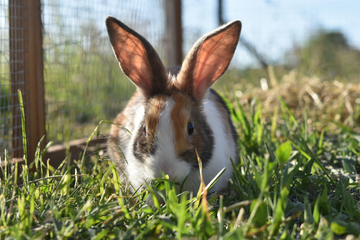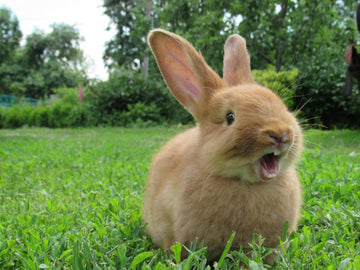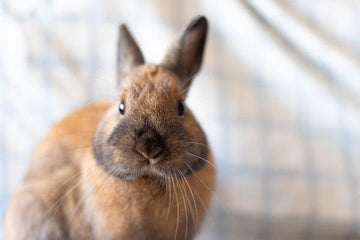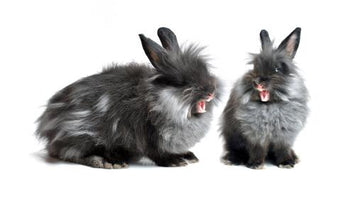The Lifelong Importance of Rabbit Grooming
Your pet rabbit does a great job keeping itself clean. Grooming is second nature to them, much like it is for cats. But does that mean you can skip brushing and other grooming tasks? Not quite. As a responsible rabbit owner, it's up to you to make sure they stay safe and healthy, and that means regular grooming.
Click Here to Shop Rabbit Products.

Rabbits are unique in many ways, and one of those ways is their inability to vomit. Unlike cats, who can cough up hairballs, rabbits cannot. That means any loose fur they swallow stays in their digestive system, which can lead to serious health problems. That alone is a big reason why brushing matters. But there's more to rabbit grooming than just brushing!
The Importance of Rabbit Grooming
The importance of rabbit grooming goes far beyond just keeping them looking neat. Grooming plays a key role in preventing health issues, strengthening the bond between you and your rabbit, and ensuring they stay comfortable in all seasons.

Unlike other small pets, rabbits are incredibly meticulous about hygiene. However, they still need help from their owners to maintain a proper grooming routine. Without regular brushing, nail trimming, and ear cleaning, rabbits can develop painful health conditions that could easily be prevented.
Why Brushing Your Rabbit is Essential
Brushing is one of the most important parts of rabbit grooming. Rabbits shed every three months or so, and if you're not brushing out that loose fur, they will groom themselves and swallow it. This can cause blockages in their digestive system, leading to dangerous conditions like GI stasis. If a rabbit's stomach becomes impacted with hair, it can make them stop eating, which is life-threatening.
Depending on your rabbit's breed and fur length, you may need to brush them more often. Short-haired rabbits may only need brushing once a week, while long-haired breeds, like Angoras, may require daily grooming.
Choosing the Right Brush
Not all brushes work well for rabbits. Because they have delicate skin, it's important to pick a brush that won't hurt or scare them.
For long-haired rabbits: Use slicker brushes and wire brushes to work through thick fur.
For short-haired rabbits: Use a soft bristle brush or fine-toothed comb.
How to Brush a Rabbit
To brush your rabbit, place them on a safe, flat surface where they feel secure. Avoid putting them on their back, as this can cause stress. Gently move the brush from the area under their ears toward their backside.
For short-haired rabbits: Use a wire brush and gently comb through their fur.
For long-haired rabbits: Use a bristle brush and work in sections to prevent tangles.
Other Important Rabbit Grooming Tasks
Dental Care
Rabbits' teeth never stop growing, which means they need constant wear to prevent overgrowth. A rabbit with malocclusion (misaligned teeth) may have difficulty eating. Providing chew toys, wooden blocks, and plenty of high-quality hay will help keep their teeth naturally worn down. If their teeth become too long, a vet may need to trim them.

Ear Cleaning
Dirty ears can lead to infections, especially in lop-eared rabbits. You can clean their ears with a cotton ball or soft cloth dampened with a vet-approved ear cleaner. Avoid pushing anything deep into the ear canal, which can cause harm.
Nail Trimming
Rabbit nails grow quickly and can become too long, leading to discomfort or injury. Their nails should be trimmed every 6–8 weeks. If your rabbit has light-colored nails, you can usually see the blood vessel (quick) inside the nail—be sure to trim just before that point. For dark-colored nails, trim small amounts at a time to avoid cutting the quick.
Not comfortable trimming your rabbit's nails? A vet can show you how or do it for you.
When and How Often to Groom Your Rabbit
The frequency of rabbit grooming depends on their fur length and the season. In warmer months, rabbits may shed more, requiring extra brushing. A general guideline is:
Short-haired rabbits: Brush once or twice a week.
Long-haired rabbits: Brush daily or every other day.
Nail trimming: Every 6–8 weeks.
Ear cleaning: As needed, usually once a month.
What to Avoid When Grooming Your Rabbit
Grooming should be a stress-free experience for your rabbit. If your rabbit shows signs of distress, such as struggling, thumping, or heavy breathing, stop and try again later. Rabbits that feel scared or restrained may injure themselves trying to escape.

Never force your rabbit into a grooming session if they're panicked. Instead, introduce grooming gradually. Use treats as positive reinforcement to create a pleasant experience. Treats can help!
The Takeaway: Why Rabbit Grooming is a Must
The importance of rabbit grooming cannot be overstated. Brushing helps prevent dangerous hairballs, while dental care, ear cleaning, and nail trimming keep your rabbit in top shape. By making grooming a regular part of your routine, you'll keep your bunny happy, healthy, and looking their best.

Rabbit Is It Low Maintenance or More Work Than You Think?

Tips to Manage Rabbit Chewing Habits

Signs of Rabbit Health: What You Should Know






